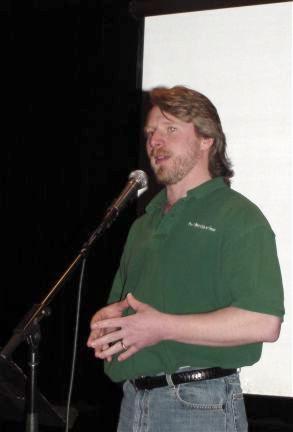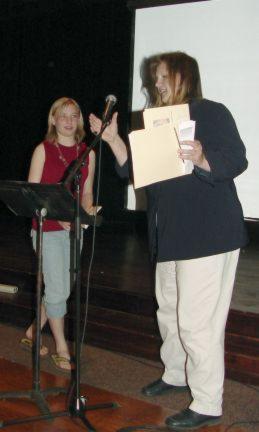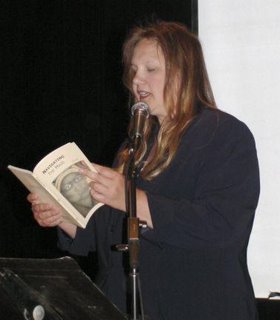Young Writers Navigate the Maze


 Picture notes:
Picture notes:. . #1 - Anita Stienstra welcomed an incipient Emily Dickinson to the microphone. All contributors were given two copies of the 2006 Navigating the Maze.
. . #2 - P&WLF president Dave Pitchford welcomed everyone to the evening's reading.
. . #3 - Anita reads a fine poem from the 2006 edition. The excellent illustrations throughout the publication were also produced by students.
On April 27 at the Hoogland Center, Poets & Writers Literary Forum welcomed young poets, poets' families, older poets and poets' friends to a reading from the organizations annual Navigating the Maze anthology of poems written by young people. The attendance and the venue were a major improvement from the first reading of its kind which had taken place at Barnes & Noble eight years ago.
. . . . Though organizers didn't mention it Thursday night, I was president of P&WLF when NTM was begun. Anita Steinstra conceived the idea, and she remains the prime mover behind the enterprise today. Poems for that first issue were selected as we sipped coffee at Bixby's Bagels on the near southwest side of Springfield. The first reading took place in the B&N coffeeshop where we shared tables and chairs with an assortment of book enthusiasts who also happened to be there at the time, howls from the nearby cappucino machine, and the peripheral buzz of folks talking at tables in raised voices to combat the distraction eminating from the nearby microphone.
. . . . This was the second NTM reading at Hoogland, and by any account, the better. An earlier event a year or two ago was held in a smaller meeting room. Hoogland's Club Room was perfect.
. . . . Introductory remarks by P&WLF president Dave Pitchford made the kids and fams feel welcome, and emphasized the value not only of writing poetry, but memorizing it. (Dave has memorized two poems, himself!) He also extolled the memory of Springfield poet Vachel Lindsay. NTM is co-sponsored by a group called the VLA, perhaps better known as the Vachel Lindsay Association.
. . . . Anita Stienstra also addressed the audience, read a few poems herself, and after the kids had read, Corrine Frisch, president of the Vachel Lindsay Association spoke and read the only poem I could hear distinctly from my perch in the extreme right front of the room. I'm sure my incapacity to hear the others was simply sub-par treble and a low volume setting. My hearing isn't what it used to be, so I'm sure that was a factor. (I can't hear a poem spoken to a microphone, but I can hear a whispered caustic remark about one of my poems three tables away at an open mic; go figger.) Corrine's delivery was an excellent example of how to do it right.
. . . . Though organizers didn't mention it, there was a visitor to the event would could not only have recited a few Vachel poems, but also a smattering of Whitman, Ferlinghetti, Pope, Sandburg and Frost. None of the speakers recited one poem. Lead by example? Not Thursday night.
. . . . . The lesson that came clear to me during this very well organized event was that if you're a kid less than 14 years old, you should understand that your "reading behind a microphone" days await you in the future. I would be surprised if any of these eager sprouts had had any choral singing or theatrical stage experience under their "belts" before attending Thursday night and bravely, gladly, generously agreeing to read their poems aloud to an audience that numbered well over 40 people. It would also astound me to learn that more than two had ever been closer than 10 inches from a microphone. The reason for this is obvious. Writing poetry is a solitary endeavor. "Writing a poem" and "reading a poem aloud behind a microphone" are oxymoronic phrases which require different skills. No wonder most poets and many creative writers don't like to give speeches: they must embrace what they do not enjoy: being extremely exposed to many eyes and being judged (by many) every nanosecond they effuse words from their trembling lips. Some poets -- can't say many poets because I don't know it's many -- believe their work is DONE when the poem is penned upon the page. "END OF POEM" they think. For poets who don't want to rely on "Fate" delivering appreciative eyes to their words on paper, they must "sell" their poems by sharing them aloud. You may not want to read about a baseball game for three hours, but you'll watch a game on television. I may not want to read a poem silently, but I'll listen to the author, or a fan, read it.
. . . . Teachers and poets organizations assume too much when they assume young poets -- and older poets -- can read or recite a poem from a microphone successfully without learning how.
. . . . Teachers should instruct students, who want to read or recite poetry, how to stand behind a microphone. There should be time set aside after school or during a study period for this. With a small speaker and inexpensive microphone, teaching during regular classtime should not bother classes in adjacent classrooms. Teach the students about projecting the voice. Simply standing an inch away from a microphone and speaking will not reveal the poem to a listener more than 10 feet away.
. . . . Organizers should lead every poet to the live microphone and show how to use it. Have the poet who intends to share a poem aloud read a line or two into the microphone a few times so he or she can hear how it sounds when it sounds right . . . and when it sounds wrong. This leadership need not inconvenience family and friends because most will be socializing anyway. The effort should take 30 to 45 seconds per poet. Don't set the speaker volume and walk away for two hours. Have someone sitting by the volume control listen to each poet and adjust the output so when a reader begins too softly to be heard by an owl, the person on the volume control can adjust the output and thus, allow each reader be heard.
. . . . Many students who aspire to be readers and reciters of poems also aspire to act on stage, to sing in a choir or band. Those students will learn how to use the most beautiful instrument in the world -- the human voice -- in the course of becoming actors or singers. But, as said earlier, often, effective readers are not always poets, and vice versa (no pun intended). Friends of poetry should not bet these kids will learn how to speak effectively somewhere else, or worse, assume they will learn elsewhere. Those who know how to share poetry out loud are just as able to instruct young people with ears for poetry as a drama coach or choir director. For every incipient Ginsburg or Lindsay there are incipient Teasdales and Dickinsons and Frosts. Discover those quiet blast furnaces who may someday warm the world and teach them how to be heard. You're doing kids no favors when you don't.
. . . . Don't write them off by saying "They're just kids. Tonight is probably the only time they'll read a poem in public, so we won't make a big deal out of L O cution. At most, they'll be center stage for 53 seconds, they will reap warm fuzzies from mom and dad, pontificating platitudes from the emcee, and that will be it." Teach young people the rest of what being a poet can be about. Ensure their success by showing them how to do things right early in the process. To do otherwise is to deprive young people of endless hours of learning and self-actualizing, rewarding activity. The woeful adult apathy and disinterest in the blooming successes of children (and grownups) sharing poetry out loud continues to deprive our community, our world, of unpredictable, unimaginable delight that we will never appreciate until we HEAR their words.
. . . . Kudos and thanks to P&WLF and participating students and parents for a memorable evening.


0 Comments:
Post a Comment
<< Home